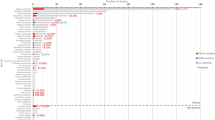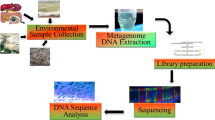Abstract
Pentatrichomonas hominis (P. hominis) is a zoonotic parasite that affects a wide range of hosts, causing gastrointestinal diseases. The present study aimed to evaluate the prevalence of P. hominis among caged foxes and raccoon dogs and the effect of P. hominis on the gut microbiota in female foxes. A total of 893 fresh fecal samples were collected from the Hebei and Henan Provinces in China. P. hominis was screened based on 18S rRNA gene expression via nested PCR. The difference in the gut microbiota between nine P. hominis-positive and nine P. hominis-negative samples was investigated by 16S rRNA gene sequencing. The total prevalence of P. hominis infection in foxes and raccoon dogs was 31.7% (283/893). The prevalence rates of P. hominis infection were 28.2% (88/312) and 33.6% (195/581) in foxes and raccoon dogs, respectively. Phylogenetic analysis revealed that all P. hominis strains detected in foxes and raccoon dogs in the present study were the zoonotic genotype CC1. Moreover, compared with those in the P. hominis-negative group, the diversity of the gut microbiota in the P. hominis-positive group was lower, and the abundance of Firmicutes and the ratio of Firmicutes/Bacteroidetes (F/B) in the P. hominis-positive group were lower than those in the P. hominis-negative group. We speculate that these differences may be due to indigestion and diarrhea in infected female foxes. Overall, the present study evaluated the prevalence of P. hominis in foxes and raccoon dogs in the Henan and Hebei Provinces and revealed that P. hominis infection interrupted the diversity of the gut microbiota in female foxes.







Similar content being viewed by others
Data availability
The datasets generated and analyzed during the current study are available from the corresponding authors on reasonable request.
References
Bäckhed F, Ley RE, Sonnenburg JL, Peterson DA, Gordon JI (2005) Host-bacterial mutualism in the human intestine. Science 307(5717):1915–20. https://doi.org/10.1126/science.1104816
Bastos BF, Brener B, de Figueiredo MA, Leles D, Mendes-de-Almeida F (2018) Pentatrichomonas hominis infection in two domestic cats with chronic diarrhea. JFMS Open Rep 4(1):2055116918774959. https://doi.org/10.1177/2055116918774959
Berry D (2016) The emerging view of Firmicutes as key fibre degraders in the human gut. Environ Microbiol 18(7):2081–3. https://doi.org/10.1111/1462-2920.13225
Berry ASF, Johnson K, Martins R, Sullivan MC, Farias Amorim C, Putre A et al (2020) Natural infection with Giardia is associated with altered community structure of the human and canine gut microbiome. mSphere 5:4. https://doi.org/10.1128/mSphere.00670-20
Bervoets L, Van Hoorenbeeck K, Kortleven I, Van Noten C, Hens N, Vael C et al (2013) Differences in gut microbiota composition between obese and lean children: a cross-sectional study. Gut Pathog 5(1):10. https://doi.org/10.1186/1757-4749-5-10
Burgess SL, Gilchrist CA, Lynn TC, Petri WA (2017) Parasitic protozoa and interactions with the host intestinal microbiota. Infect and Immun 85:8. https://doi.org/10.1128/IAI.00101-17
Chavoya-Guardado MA, Vasquez-Garibay EM, Ruiz-Quezada SL, Ramírez-Cordero MI, Larrosa-Haro A, Castro-Albarran J (2022) Firmicutes, Bacteroidetes and Actinobacteria in human milk and maternal adiposity. Nutrients 14:14. https://doi.org/10.3390/nu14142887
Compaoré C, Kemta Lekpa F, Nebie L, Niamba P, Niakara A (2013) Pentatrichomonas hominis infection in rheumatoid arthritis treated with adalimumab. Rheumatology (Oxford) 52(8):1534–5. https://doi.org/10.1093/rheumatology/kes385
Corbeil LB, Campero CM, Van Hoosear K, Bondurant RH (2008) Detection of trichomonad species in the reproductive tracts of breeding and virgin bulls. Vet Parasitol 154(3–4):226–32. https://doi.org/10.1016/j.vetpar.2008.03.014
Dave M, Higgins PD, Middha S, Rioux KP (2012) The human gut microbiome: current knowledge, challenges, and future directions. Transl Res 160(4):246–57. https://doi.org/10.1016/j.trsl.2012.05.003
Delgado-Viscogliosi P, Viscogliosi E, Gerbod D, Kulda J, Sogin ML, Edgcomb VP (2000) Molecular phylogeny of parabasalids based on small subunit rRNA sequences, with emphasis on the Trichomonadinae subfamily. J Eukaryot Microbiol 47(1):70–5. https://doi.org/10.1111/j.1550-7408.2000.tb00013.x
Dimasuay KG, Rivera WL (2013) Molecular characterization of trichomonads isolated from animal hosts in the Philippines. Vet Parasitol 196(3–4):289–95. https://doi.org/10.1016/j.vetpar.2013.03.019
Doğan N, Tüzemen N (2018) Three Pentatrichomonas hominis cases presenting with gastrointestinal symptoms. Turkiye Parazitol Derg 42(2):168–170. https://doi.org/10.5152/tpd.2018.4846
Fan X, Jin Y, Chen G, Ma X, Zhang L (2021) Gut microbiota dysbiosis drives the development of colorectal cancer. Digestion 102(4):508–515. https://doi.org/10.1159/000508328
Gómez-Gallego C, Forsgren M, Selma-Royo M, Nermes M, Collado MC, Salminen S et al (2021) The composition and diversity of the gut microbiota in children is modifiable by the household dogs: impact of a canine-specific probiotic. Microorganisms 9:3. https://doi.org/10.3390/microorganisms9030557
Gookin JL, Birkenheuer AJ, St John V, Spector M, Levy MG (2005) Molecular characterization of trichomonads from feces of dogs with diarrhea. J Parasitol 91(4):939–43. https://doi.org/10.1645/GE-474R.1
Gookin JL, Stauffer SH, Coccaro MR, Poore MF, Levy MG, Papich MG (2007) Efficacy of tinidazole for treatment of cats experimentally infected with Tritrichomonas foetus. Am J Vet Res 68(10):1085–8. https://doi.org/10.2460/ajvr.68.10.1085
Grellet A, Brunopolack Feugier A, Boucraut-Baralon C, Grandjean D, Vandewynckel L, Cian A et al (2013) Prevalence, risk factors of infection and molecular characterization of trichomonads in puppies from French breeding kennels. Vet Parasitol 197(3–4):418–26. https://doi.org/10.1016/j.vetpar.2013.07.030
Harp JA, Chen W, Harmsen AG (1992) Resistance of severe combined immunodeficient mice to infection with Cryptosporidium parvum: the importance of intestinal microflora. Infect Immun 60(9):3509–12. https://doi.org/10.1128/iai.60.9.3509-3512.1992
Huang S, Zhang H (2013) The impact of environmental heterogeneity and life stage on the hindgut microbiota of Holotrichia parallela larvae (Coleoptera: Scarabaeidae). PloS one 8(2):e57169. https://doi.org/10.1371/journal.pone.0057169
Jang HJ, Son S, Kim JA, Jung MY, Choi YJ, Kim DH et al (2021) Characterization and functional test of canine probiotics. Front Microbiol 12:625562. https://doi.org/10.3389/fmicb.2021.625562
Kim YA, Kim HY, Cho SH, Cheun HI, Yu JR, Lee SE (2010) PCR detection and molecular characterization of Pentatrichomonas hominis from feces of dogs with diarrhea in the Republic of Korea. Korean J Parasitol 48(1):9–13. https://doi.org/10.3347/kjp.2010.48.1.9
Kim SK, Guevarra RB, Kim YT, Kwon J, Kim H, Cho JH et al (2019) Role of probiotics in human gut microbiome-associated diseases. J Microbiol Biotechnol 29(9):1335–1340. https://doi.org/10.4014/jmb.1906.06064
Li W, Li W, Gong P, Zhang C, Yang J, Zhang X et al (2015) The prevalence of intestinal trichomonads in Chinese pigs. Vet Parasitol 211(1–2):12–5. https://doi.org/10.1016/j.vetpar.2015.04.028
Li WC, Wang K, Zhang W, Wu J, Gu YF, Zhang XC (2016) Prevalence and molecular characterization of intestinal trichomonads in pet dogs in east China. Korean J Parasitol 54(6):703–710. https://doi.org/10.3347/kjp.2016.54.6.703
Li WC, Ying M, Gong PT, Li JH, Yang J, Li H et al (2016) Pentatrichomonas hominis: prevalence and molecular characterization in humans, dogs, and monkeys in Northern China. Parasitol Res 115(2):569–74. https://doi.org/10.1007/s00436-015-4773-8
Li X, Li J, Zhang X, Yang Z, Yang J, Gong P (2017) Prevalence of Pentatrichomonas hominis infections in six farmed wildlife species in Jilin, China. Vet Parasitol 244:160–163. https://doi.org/10.1016/j.vetpar.2017.07.032
Li WC, Wang K, Gu Y (2018) Occurrence of Blastocystis sp. and Pentatrichomonas hominis in sheep and goats in China. Parasit Vectors 11(1):93. https://doi.org/10.1186/s13071-018-2671-5
Li WC, Huang JM, Fang Z, Ren Q, Tang L, Kan ZZ et al (2020) Prevalence of Tetratrichomonas buttreyi and Pentatrichomonas hominis in yellow cattle, dairy cattle, and water buffalo in China. Parasitol Res 119(2):637–647. https://doi.org/10.1007/s00436-019-06550-0
Liu H, Li Z, Si H, Zhong W, Fan Z, Li G (2020) Comparative analysis of the gut microbiota of the blue fox (Alopex lagopus) and raccoon dog (Nyctereutes procyonoides). Arch Microbiol 202(1):135–142. https://doi.org/10.1007/s00203-019-01721-0
Lynch SV, Pedersen O (2016) The human intestinal microbiome in health and disease. N Engl J Med 375(24):2369–2379. https://doi.org/10.1056/NEJMra1600266
Mahittikorn A, Udonsom R, Koompapong K, Chiabchalard R, Sutthikornchai C, Sreepian PM et al (2021) Molecular identification of Pentatrichomonas hominis in animals in central and western Thailand. BMC Vet Res 17(1):203. https://doi.org/10.1186/s12917-021-02904-y
Mazmanian SK, Round JL, Kasper DL (2008) A microbial symbiosis factor prevents intestinal inflammatory disease. Nature 453(7195):620–5. https://doi.org/10.1038/nature07008
Romatowski J (2000) Pentatrichomonas hominis infection in four kittens. J Am Vet Med Assoc 216(8):1270–2. https://doi.org/10.2460/javma.2000.216.1270
Rossi O, van Baarlen P, Wells JM (2013) Host-recognition of pathogens and commensals in the mammalian intestine. Curr Top Microbiol Immunol 358:291–321. https://doi.org/10.1007/82_2011_191
Satoskar A, Alexander J (1995) Sex-determined susceptibility and differential IFN-gamma and TNF-alpha mRNA expression in DBA/2 mice infected with Leishmania mexicana. Immunology 84(1):1–4
Sui Y, Tong C, Li X, Zheng L, Guo Y, Lu Y et al (2021) Molecular detection and genotyping of Enterocytozoon bieneusi in captive foxes in Xinxiang, Central China and its impact on gut bacterial communities. Res Vet Sci 141:138–144. https://doi.org/10.1016/j.rvsc.2021.10.023
Sui Y, Zhang X, Wang H, Yu F, Zheng L, Guo Y et al (2022) Prevalence and genetic diversity of Giardia duodenalis in pet dogs from Zhengzhou, central China and the association between gut microbiota and fecal characteristics during infection. One Health 14:100401. https://doi.org/10.1016/j.onehlt.2022.100401
Tolbert MK, Leutenegger CM, Lobetti R, Birrell J, Gookin JL (2012) Species identification of trichomonads and associated coinfections in dogs with diarrhea and suspected trichomonosis. Vet Parasitol 187(1–2):319–22. https://doi.org/10.1016/j.vetpar.2011.12.031
Turnbaugh PJ, Ley RE, Mahowald MA, Magrini V, Mardis ER, Gordon JI (2006) An obesity-associated gut microbiome with increased capacity for energy harvest. Nature 444(7122):1027–31. https://doi.org/10.1038/nature05414
Wang X, Shang Y, Wei Q, Wu X, Dou H, Zhang H et al (2022) Comparative analyses of the gut microbiome of two fox species, the red fox (Vulpes Vulpes) and corsac fox (Vulpes Corsac), that occupy different ecological niches. Microb Ecol 83(3):753–765. https://doi.org/10.1007/s00248-021-01806-8
Zhang N, Zhang H, Yu Y, Gong P, Li J, Li Z et al (2019) High prevalence of Pentatrichomonas hominis infection in gastrointestinal cancer patients. Parasit Vectors 12(1):423. https://doi.org/10.1186/s13071-019-3684-4
Zhang H, Yu Y, Li J, Gong P, Wang X, Li X et al (2022) Changes of gut microbiota in colorectal cancer patients with Pentatrichomonas hominis infection. Front Cell Infect Microbiol 12:961974. https://doi.org/10.3389/fcimb.2022.961974
Zhang H, Zhang N, Gong P, Cheng S, Wang X, Li X et al (2022) Prevalence and molecular characterization of Pentatrichomonas hominis in Siberian tigers (Panthera tigris altaica) in northeast China. Integr Zool 17(4):543–549. https://doi.org/10.1111/1749-4877.12629
Zhu YJ, Xu ZP, Ji MJ (2020) Advances in the research on the interaction between human parasites and gut microbiota. Zhongguo Xue Xi Chong Bing Fang Zhi Za Zhi 32(6):649–653. https://doi.org/10.16250/j.32.1374.2019303
Acknowledgements
We would like to show our sincere appreciation to Anhui Science and Technology University for providing the P. hominis positive control sample and the owners of foxes and raccoon dogs for the help they provided during the experiment.
Funding
This study was supported by the Project of Young Backbone Teachers of Colleges and Universities in Henan Province (No. 2018GGJS031) and the Key Scientific and Technological Research Project of Henan Province (No. 19102110079) and supported by the Open Project Program of Beijing Key Laboratory of Traditional Chinese Veterinary Medicine at Beijing University of Agriculture (No. TCVM-201702).
Author information
Authors and Affiliations
Contributions
HJD designed the study and supplied the methodology. PTS conducted data analysis and article writing; YNG conducted material collection and testing; SJZ, LLL, FL, and TZ checked the manuscript for grammar and spelling; and HYD and HJD were responsible for supervision, writing review, and funding. All authors reviewed the manuscript.
Corresponding authors
Ethics declarations
Ethics approval
Not applicable.
Consent to participate
Not applicable.
Consent for publication
The authors declare that they know the content of this manuscript and agree to submit it to Parasitology Research.
Competing interests
No potential conflict of interest was reported by the authors.
Authors and affiliations
Pengtao Song and Yunan Guo authors contributed equally to this work.
Authors and Affiliations
College of Veterinary Medicine, Henan Agricultural University, No. 15 Longzihu University Area, Zhengdong New District, Zhengzhou 450046, China.
Pengtao Song, Yunan Guo, Shoujun Zuo, Liangliang Li, Fang Liu, Tao Zhang, Hongyu Dai, Haiju Dong
Corresponding authors
Correspondence to Hongyu Dai or Haiju Dong.
Additional information
Section Editor: Xing-Quan Zhu
Publisher's Note
Springer Nature remains neutral with regard to jurisdictional claims in published maps and institutional affiliations.
Rights and permissions
Springer Nature or its licensor (e.g. a society or other partner) holds exclusive rights to this article under a publishing agreement with the author(s) or other rightsholder(s); author self-archiving of the accepted manuscript version of this article is solely governed by the terms of such publishing agreement and applicable law.
About this article
Cite this article
Song, P., Guo, Y., Zuo, S. et al. Prevalence of Pentatrichomonas hominis in foxes and raccoon dogs and changes in the gut microbiota of infected female foxes in the Hebei and Henan Provinces in China. Parasitol Res 123, 74 (2024). https://doi.org/10.1007/s00436-023-08099-5
Received:
Accepted:
Published:
DOI: https://doi.org/10.1007/s00436-023-08099-5




